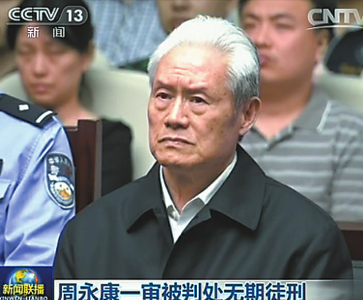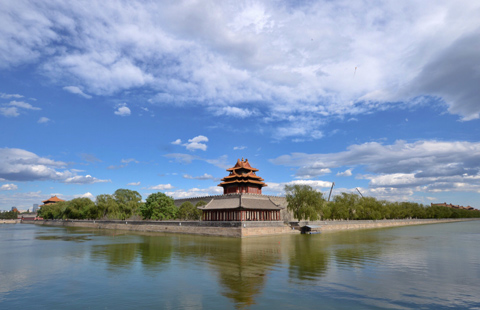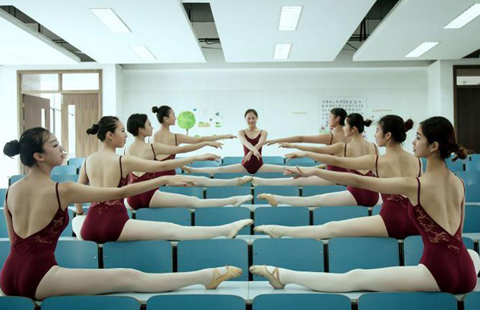Zhou Yongkang sentenced to life in prison
Updated: 2015-06-12 06:35
(Xinhua)
|
||||||||
 |
|
A screen grab from CCTV shows Zhou Yongkang waiting to hear his sentence at a Tianjin court on Thursday. CHINA DAILY |
TIANJIN - Zhou Yongkang was sentenced to life imprisonment Thursday for accepting bribes, abusing his power and deliberately disclosing state secrets, Tianjin Municipal No. 1 Intermediate People's Court ruled.
|
Timeline · July 29, 2014 The Communist Party of China Central Committee announced that Zhou was being investigated on suspicion of "serious disciplinary violations". · Dec 5, 2014 Zhou was expelled from the Party, according to a decision made at a meeting of the Political Bureau of the CPC Central Committee. The meeting also decided to transfer the suspected criminal case of Zhou to judicial organs. · Jan 7, 2015 Zhou was transferred to prosecuting authorities with 29 other former high-ranking officials, including Jiang Jiemin, former minister of the State-owned Assets Supervision and Administration Commission; Li Dongsheng, former deputy minister at the Ministry of Public Security; and Li Chongxi, former chairman of the Sichuan Provincial Committee of the Chinese People's Political Consultative Conference. · April 3, 2015 Zhou was charged with bribery, abuse of power and intentional disclosure of State secrets. The indictment was brought by the Tianjin People's Procuratorate No 1 branch to the Tianjin No 1 Intermediate People's Court. · June 11, 2015 Zhou was sentenced to life imprisonment for accepting bribes, abusing power and deliberately disclosing State secrets, with his political rights deprived for life and personal assets confiscated. |
Zhou, 73, was also deprived of his political rights for life and had his personal assets confiscated.
The court heard his case on May 22. Involving disclosure of state secrets, Zhou's trial was not open to the public. Zhou pleaded guilty and will not appeal.
Zhou was formerly a member of the Standing Committee of the Political Bureau of the Communist Party of China (CPC) Central Committee and secretary of the Commission for Political and Legal Affairs of the CPC Central Committee.
Before that, he had served as deputy general manager of China National Petroleum Corp., secretary of CPC Sichuan Provincial Committee, and member of the Political Bureau of the CPC Central Committee while he was minister of public security and state councilor.
ACCEPTING BRIBES, ABUSE OF POWER, LEAKING STATE SECRETS
Zhou was convicted of accepting bribes of about 130 million yuan (21.3 million US dollars), according to the judgement.
The court ruled that Zhou had used his position to seek profits for five people, identified as Wu Bing, Ding Xuefeng, Wen Qingshan, Zhou Hao and Jiang Jiemin, and had personally accepted money and property worth 731,100 yuan from the latter.
Money and property worth 129 million yuan was accepted by his wife Jia Xiaoye and son Zhou Bin. Zhou was informed about these bribes after the fact.
According to the judgement, Zhou instructed Jiang Jiemin and Li Chuncheng to assist in the business activities of others, helping them to illegally obtain about 2.14 billion yuan and causing losses to the state of 1.49 billion yuan.
Zhou leaked five "extremely confidential" documents and one "confidential" document to Cao Yongzheng, an unauthorized person, directly contravening the State Secret Law.
Zhou's wife and son testified through video link while Wu Bing and Jiang Jiemin appeared in court. Other witness statements were presented along with the evidence.
The court statement said Zhou had taken "particularly huge bribes," but had confessed, pleaded guilty and repented for his wrongdoing. The majority of the money was accepted by his relatives, without his prior knowledge. Zhou asked his relatives to return their illegal gains. All gifts and cash have now been recovered. These actions constitute "legal and discretionary grounds for lesser punishment."
The court said that Zhou's abuse of power and deliberate disclosure of state secrets were "in particularly grave circumstances," but his disclosure of state secrets "did not have very serious consequences."
The court reached its verdict "in accordance with the facts, nature, and details" of Zhou's crimes, based on the harm done to society.

 Want new ear or car? Try 3-D printing
Want new ear or car? Try 3-D printing
 Ten photos you don't wanna miss - June 12
Ten photos you don't wanna miss - June 12
 Beijing enjoys clear skies
Beijing enjoys clear skies
 Top 10 investor countries and regions
Top 10 investor countries and regions
 Beijing showcases Olympic exhibits and visions
Beijing showcases Olympic exhibits and visions
 Ten photos you don't wanna miss - June 11
Ten photos you don't wanna miss - June 11
 Youth of today in Sudan
Youth of today in Sudan
 EU sanctions hamper Italian-Russian commercial ties: Putin
EU sanctions hamper Italian-Russian commercial ties: Putin
Most Viewed
Editor's Picks

|

|

|

|

|

|
Today's Top News
China's former security chief sentenced to life
Top China, US military brass hold talks at the Pentagon
Murdoch's sons to become CEO, co-chair at 21st Century Fox
Carter greets General Fan at Pentagon
Pentagon to greet General from China
Helping the Hill understand China
Suu Kyi begins groundbreaking visit
Michelle Kwan to work for Hillary Clinton campaign
US Weekly

|

|






